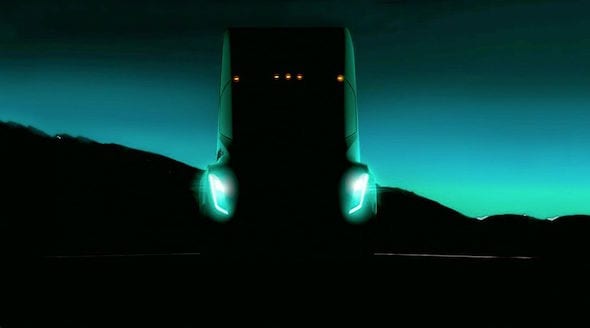Tesla founder and CEO Elon Musk has become one of the best known people on the planet through his extraordinary ability to make the future look cool. And created enormous wealth for a company that has still to spin a profit.
But it is with the newly unveiled Tesla truck, with all its Darth Vader comparisons (particularly in darker hues), that Musk has torn down the final frontiers of the campaign against the clean energy transition – cost. And doing that, he has gone to the very heartland of its resistance: the trucking industry.
Like his previous electric cars, the Roadster, the Model S, Model X, and Model 3, Musk has rolled out a product that is smarter, cleaner and safer, as well as aspirational.
What’s not to like about a truck that doesn’t jack-knife, can do 0-100kms in 6 seconds (without load), can go up inclines at a steady 100kms (with load), has a cool centralised driving position, wrap-around armoured glass windows, touch screens, and doesn’t pollute.

But the killer is the cost. By offering savings of 20 per cent or more, Musk is making electric trucks a no-brainer for the road transport industry, where every un-necessary detour, or rapid braking or acceleration is an assault on already fine margins.
We have written before about the potential for the Tesla truck to turn the freight industry on its head, and one of the key analysts quoted in that report, Morgan Stanley, says the actual product is better than they had expected.
The Tesla truck, they note, beats diesel trucks in just about every measurable way.
“Many questioned whether the Tesla truck would have the range, performance and payload to be able to match current diesel trucks, but the numbers cited by Tesla should comfortably allay such fears,” the Morgan Stanley analysts write.
The key – apart from features mentioned above – is the range, with a 500 mile (800km) option (fully loaded), and a 300 mile option, a network of “megachargers” that will be able to give the truck 400 miles of range in 30 minutes, all wheel drive capability.

What’s more, unlike the its competitors, the Tesla truck will be a full class 8 vehicle, not a class 7 like its EV peers. This makes it the industry’s first true Class 8 EV truck.
The savings are real. The all-in costs, including lease, are 20 per cent cheaper than a diesel truck, and around 50 per cent cheaper if operating in a “platoon” – where trucks follow closely another in semi-autonomous mode.
Tesla claims significantly lower maintenance costs (similar to EV passenger cars) and is offering charging at fixed electricity prices, thus virtually guaranteeing operating costs for truck fleet operators and 1 million miles of break-down free use.
Tesla base claims are for $US200,000+ in fuel savings and a two-year payback period for the truck. Morgan Stanley anticipates significant utilisation benefits on top of this, with quick pay-back on smart controls that could be added. (See table).
Again, as we noted at the original launch of the Model 3 – see Tesla’s Elon Musk just killed the petrol car – it matters little whether Tesla itself manages to pull this off, or crumbles under the weight of the extraordinary targets set by Musk, and simply runs out of money and share market confidence.
That’s because Tesla has already changed two trillion-dollar industries for ever: transport and electricity.
Since Tesla first wheeled out the Model S, the vehicle industry has been turned on its head.
Virtually every other car maker has now pledged to focus on EVs, and the big economies are giving the laggards little choice: France and England have vowed to phase out new sales of petrol and diesel cars, and India and China – choked by pollution – may soon follow.
Tesla is changing the electricity industry too, as the new report from the office of Alan Finkel highlights. The knowledge and enthusiasm of consumers for battery storage and distributed energy is driven almost entirely by what they have heard of the Tesla brand, and its Powerwall and Powerpack batteries.
“I think we can’t underestimate the … Tesla implications. Tesla batteries are the sexy looking batteries….. Digital media is becoming more and increasingly prevalent, so people want the new gismo as part of their household future,” the report cites one interview.
Which is not to say that everyone will buy Tesla batteries, or Tesla cars or trucks. They might find cheaper or more suitable alternatives.
But the batteries – along with the plunging costs of solar and other renewables – help cause a major rethink about the way electricity is delivered; from fossil fuels to renewables, and from centralised generation to decentralised and consumer power.
It has caused energy market designers to more readily embrace the idea of 100 per cent renewable energy – or as near as – for their grids. And with battery storage, and much of the investment eagerly taken by by households and business, the cost is vastly reduced.
So, as Morgan Stanley notes, Tesla does have a lot on its plate.
“Tesla has the lineup and the ambition – it’s now time to deliver,” it notes.
“Between the Model 3 rollout, the gigafactory, the Semi and the Roadster (not to mention the upcoming Model Y and pickup, which Tesla also teased at the event), Tesla has its hands full for the next 3 years.”
That is more about its own fortunes. Its impact on broader industries – cars, trucks, freight, storage and energy – is already profound.










